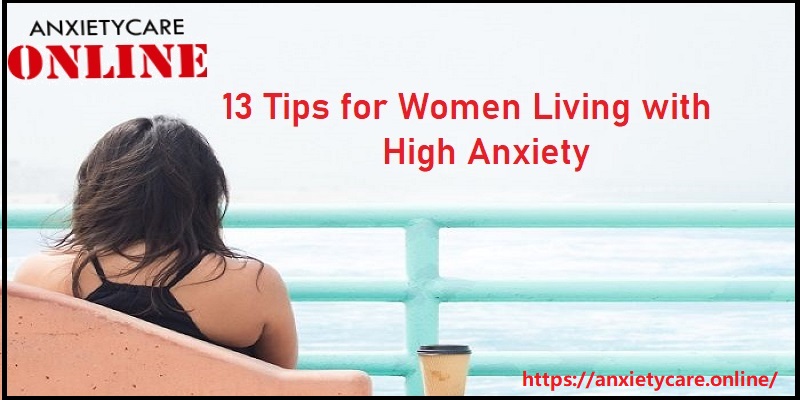Tips For Women Living With High Anxiety – Social Anxiety disorders
Tips For Women Living With High Anxiety
An anxiety disorder is a severe medical condition that interferes with a person’s day-to-day life and makes them stressed without any apparent reason. Social Anxiety disorders are as real as any physical disorder. According to the latest data, an estimated 264 million people globally suffer from an anxiety disorder. Studies also indicate that women are twice as likely as men to develop an anxiety disorder in their lifetime. Recent studies found that the prevalence of any anxiety disorder was higher for women at 23.4% than men at 14.3%.
Anxiety disorders are particular psychiatric disorders that include extreme worry or fear. The most prevalent anxiety disorders include:
⦁ Generalized anxiety disorder (GAD)
⦁ Panic disorder and panic attacks
⦁ Agoraphobia
⦁ Social anxiety disorder
⦁ Separation anxiety
⦁ Selective mutism
⦁ Specific phobias
The following are the signs and symptoms of an anxiety disorder:
⦁ Nervousness
⦁ Irritability
⦁ A sense of impending doom or danger
⦁ Increased heart rate
⦁ Hyperventilation (rapid breathing)
⦁ Sweating and trembling
⦁ Weakness or tiredness
⦁ Trouble concentration
⦁ Difficulty sleeping
⦁ Gastrointestinal problems
People regularly experiencing anxiety don’t have to depend on medications as their only source of comfort. You can try the following to calm your mind and reduce stress. Try incorporating these things into your daily routine to get the most out of them.
Move Your Body – Exercise
Regular exercise is crucial for maintaining physical and mental health. Working out can boost your sense of well-being and ease anxiety. Try doing 30-minute workouts three to five times a week. Also, be sure to choose the activities you enjoy, so you would be less likely to miss the exercise session.

Don’t Ignore sleep
The duration and quality of sleep you get can be detrimental to your physical and mental health. Doctors typically recommend an average of eight hours of complete shut-eye rest every night. Lack of sleep can worsen your mental problem like anxiety. However, an anxiety disorder can also make it hard for a person to fall asleep. It is a vicious cycle that you can only break by adopting a healthy sleeping routine that includes the following:
⦁ Leave the screens behind before going to bed.
⦁ Try to sleep and wake up at the same time each day.
⦁ Make sure your bed and sleeping environment is comfortable.
⦁ Try keeping the room temperature a little cooler.
Reduce Caffeine And Alcohol Intake
Beverages containing alcohol and caffeine can hamper your ability to get proper rest. People with anxiety have trouble calming their minds, and caffeinated drinks are the exact opposite of what you want. Caffeine is a stimulant that promotes brain activity, which worsens the problem of anxiety.
Alcohol can also kick your anxiety into high gear. Try to cut alcohol and caffeine intake, especially in the evening hours, to avoid making your situation even worse.
Caffeine is not only present in coffee and soda; you can also find it in the following:
⦁ Tea
⦁ Chocolate
⦁ Headache medicines
⦁ Diet pills
Schedule Your Worry Time
Allotting a specific time to worry can help you focus on other things during the day. Doctors recommend taking 30 minutes to figure out what’s bothering you and what you can do to fix it. Try being consistent by having the worry sessions at the same time each day. During this period, focus on what makes you anxious and discard what are just perceived threats.
Doing this can help you identify the problem so you can work on it and feel better.
Take A Deep Breath
A sigh of relief; that is what a deep breath is. It is a signal to your brain that you are okay. Taking deep breaths can help your body and mind relax and reduce the anxiousness developing in your brain.
Try to lie don on a flat surface, put one hand on your stomach and the other on the chest, and then take a slow and deep breath. Let the air fill your belly and make it rise. Hold it in for a second, then slowly release it. Do this a couple of times, and you will feel the calmness.
Be The Boss Of Your Thoughts
Try turning the negativity into positivity, and it starts with your thoughts. Imagine yourself facing the fears head-on. The more you think about facing your fears, the easier it will become to deal with the unavoidable dread that comes with anxiety.
Tame Tense Muscles
Tense muscles can be very uncomfortable and make you irritable and anxious. Try relaxing them with simple exercises by choosing a muscle group and tightening it for a few seconds, then letting go. Prioritize one section at a time and work through the entire body. You can follow a technique called progressive muscle relaxation to ease the tense muscles.
Help Out In The Community
Spend time doing things for others. It can help you get out of your head and experience the world from a different perspective. You can volunteer for community work to help out others. Doing this work will not only help you feel good about giving back to society, but you can also make connections that can become your support system.
Look For Triggers
Keep note of the places and situations where you feel most anxious. Write them down if you need them. Try looking for patterns and work on ways to avoid or confront your worries and fears. Knowing your anxiety triggers can help you to be ready for the next time you feel anxious.

Comments